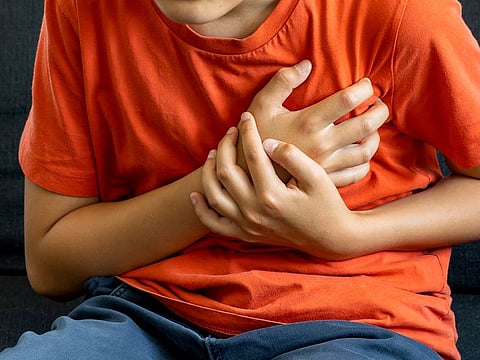Dubai man’s heart stops 25 times within hours, doctors save him
The ordeal began with a heart attack triggered by a complete blockage in a major artery

Dubai: A man in his 40s has miraculously survived after his heart stopped more than 25 times in a matter of hours, in an extraordinary medical case that reads more like a medical miracle than a clinical case study.
The patient, who arrived at the emergency room of Rashid Hospital in Dubai with a massive heart attack, went into repeated cardiac arrest.
Each time, the medical team brought him back using defibrillator shocks. He was immediately rushed into an emergency catheterization procedure, where doctors successfully opened a blocked coronary artery and inserted a life-saving stent.
“We truly thought announcing his death was just a matter of time,” said Dr. Fahad Baslaib, executive director of Rashid Hospital and head of the cardiology department.
“But on the first working day after the weekend, we saw him having breakfast. That moment taught us never to lose hope.”
Warning signs
The patient’s ordeal began with a heart attack triggered by a complete blockage in a major artery. As his condition deteriorated, medical staff delivered repeated defibrillator shocks to restart his heart. It wasn’t until an emergency catheter procedure opened the clogged artery and restored blood flow that his life was finally out of danger.
Dr. Baslaib used the case to deliver a warning about cholesterol, which he likened to a “dormant volcano” capable of triggering deadly cardiac events without warning. “It may lie quiet for years,” he said, “then erupt in an instant.”
According to him, the early morning hours, from dawn until noon, are the most dangerous for cardiac arrests. During this window, hormonal fluctuations involving cortisol and adrenaline can raise blood pressure, accelerate heart rate, and increase blood viscosity, all of which elevate the risk of sudden arterial blockages, especially in individuals with undiagnosed partial obstructions.
Dr. Baslaib attributed the hospital’s achievement to the country’s leadership, praising their commitment to strengthening the healthcare sector through substantial investments in state-of-the-art infrastructure, advanced medical equipment, and most importantly the continuous development and global training of Emirati medical professionals.
“Some hospitals here are now better equipped than those in the United States,” he noted. That’s not hyperbole. Rashid Hospital became the first healthcare facility in the Middle East to receive accreditation from the American Heart Association for its cardiac emergency program in 2009, a certification it has since renewed multiple times.
Last month, during a routine reassessment, the visiting American evaluator told hospital staff, “If I or a family member had a cardiac issue, I’d want to be treated here.” That remark, Baslaib said, was “a badge of honor for the entire team”.
Leading cause of death
Cardiovascular disease is the leading cause of death globally, with one in every four deaths attributed to heart-related conditions. Yet, Dr. Baslaib stressed that 80 per cent of such fatalities are preventable through early screening and healthier lifestyles.
He also highlighted the alarming rise in sudden cardiac deaths among young athletes, often caused by undiagnosed electrical disorders or abnormal heart muscle enlargement. Even those who pass routine screenings can still be at risk due to undetected cholesterol buildup.
“Cholesterol is the silent threat,” he said. “It doesn’t always show up in tests, but it can strike at any time, just like a hidden fault line in the earth.”
Perhaps most troubling is the regional trend: the average age of heart attack patients in the Gulf is 10 years younger than in Europe or the US, often occurring in individuals as young as 40 or 50.
Lifestyle choices
Dr. Baslaib attributes this to a combination of sedentary lifestyles, poor diet, and the high prevalence of smoking, including new forms like electronic cigarettes and medwakh pipes.
“Whether it's a traditional cigarette or a modern vape, they're all toxic to the heart,” he said. “There’s no such thing as a safer smoke.”
He noted that a single shisha session could be equivalent to smoking an entire pack of cigarettes, or even up to 40 cigarettes by some estimates.
Dr. Baslaib warned against going to bed in a state of emotional distress. “Sleeping while sad or anxious significantly increases the risk of a cardiac event,” he said, reinforcing the importance of mental health in cardiovascular care.


